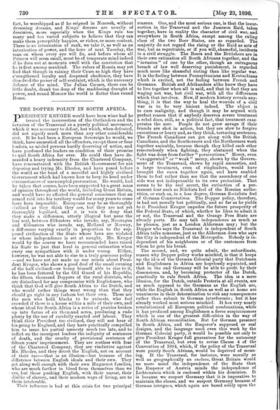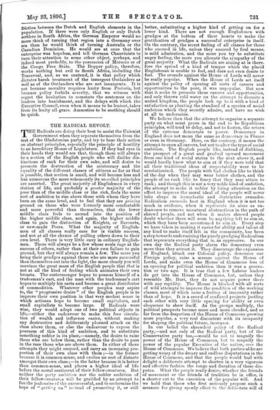THE DOPPER POLICY IN SOUTH AFRICA.
PRESIDENT KRUGER would have been wiser had he treated the insurrection of the Outlanders and the invasion of the Transvaal as a purely political movement, which it was necessary to defeat, but which, when defeated, did not signify much more than any other considerable riot. If he had been a European Sovereign he would, we think, have amnestied all the offenders, except three or four leaders, as misled persons hardly deserving of notice, and have pardoned the leaders on condition of their promise to quit South Africa for ever. He could then have de- manded a heavy indemnity from the Chartered Company, have remonstrated with the British Government for not deposing and trying Mr. Rhodes, and have posed before the world as the head of a merciful and highly civilised Government which had known how to keep its head under circumstances of unexampled provocation. He would, had he taken that course, have been supported by a. great mass of opinion throughout the world, including Great Britain, and would have so affected the general conscience that an armed raid into his territory would for many years to come have been impossible. Europeans may be as thoroughly civilised as they think they are, but they are not yet thoroughly legalised, and it is vain to deny that they make a difference, utterly illogical but none the less real, between filibusters who invade, say, Nicaragua and filibusters who invade, say, Holland or Norway, a difference varying exactly in proportion to the sup- posed civilisation of the State whose laws are violated or whose independence is set at naught. Mr. Kruger would by the course we have recommended have raised his State to just that level in general estimation when every one sympathises with it under wrong. Either, however, be was not able to rise to a truly generous policy —and we have not yet made up our minds about Presi- dent Kruger, who shows a good deal of the small cunning of the half civilised—or being himself able to rise to it, he has been fettered by the Old Guard of his Republic, the fifteen thousand Doppers of the rural districts, who are disinclined for any compromise with Englishmen, who think that God will give South Africa to the Dutch, and who would rather things went wrong than that they should go right in any fashion but their own. These are the men who hold blacks to be animals, who feel crowded if there is a house within a mile of their own, and whose ideal for South Africa is a series of prairies broken up into farms of six thousand acres, producing a rude plenty by the use of carefully exacted serf labour. They think their President too civilised, they will not hear of his going to England, and they have practically compelled him to issue his partial amnesty much too late, and to inflict on the insurgent leaders the indignity of sentences of death, and the cruelty of provisional sentences of fifteen years' imprisonment. They are restless with fear of the Chartered Company, they are vindictive against Mr. Rhodes, and they detest the English, not on account of their race—that is an illusion—but because of the difference between English ideals and their own. They get along well enough with their own Huguenot families, who are much farther in blood from themselves than we • are, but these pushing English, with their unrest, their dislike of slavery, and their modern ways of living, are to them intolerable.
Their influence is bad at this crisis for two principal reasons. One, and the most serious one, is that the insur- rection in the Transvaal and the Jameson Raid, taken together, have in reality the character of civil war, and. everywhere in South Africa, except among the ruling class of the two Boer States, are so regarded. The majority do not regard the rising or the Raid as acts of war, but as regrettable, or if you will, shameful, incidents in a civil struggle. The Boers and the Britishers are in their own estimation all South Africans together, and the "invasion" of one by the other, though an outrageous breach of law well deserving punishment, is regarded much more like shameful rioting than like regular war. It is the feeling between Pennsylvanians and Kentuckians which is excited, not the feeling between French and Germans. British and Afrikanders alike know they have to live together when all is said, and that in fact they are waging not war, but civil war, with all the differences which that involves. Now, if modern history reveals any- thing, it is that the way to heal the wounds of a civil war is to be very lenient indeed. The object is to cure malignity, and though it may be argued with perfect reason that if anybody deserves severe treatment a rebel does, still, as a political fact, that treatment exas- perates the sore. People do not grow savage if their friends are shot in action, but they are slow to forgive executions or heavy and, as they think, torturing sentences. The French Canadians can get along with the British Canadians, and the Southerners and the Northerners work together amicably, because though they killed each other remorselessly when fighting, they abstained when the fight was done from further "persecutions." Mercy, even " exaggerated" or " weak " mercy, shown by the Govern- ment of the Transvaal, shown by rapid amnesties, and a large treatment, even of ringleaders, would have brought the races together again, and have enabled them to feel rather than see that the ascendency of one side was not indispensable to its own protection. That seems to be the real secret, the extinction of a per- manent fear such as Nihilists feel of the Russian autho- rities, or such as, in a less degree, German Socialists feel of German Conservatives. The Dopper policy, therefore, is bad not morally but politically, and so far as he yields to it President Kruger impedes the future prosperity of the Federal State, of which, whether he likes to admit it or not, the Transvaal and the Orange Free State are already parts. He may talk independence as much as he pleases, just as a London Alderman may; but the Dopper who says the Transvaal is independent of South Africa talks nonsense, just as the Alderman does who says the City is independent of the Metropolis. Nobody is in- dependent of his neighbours or of the customers from whom he gets his bread.
The second, and, we quite admit, the subordinate, reason why Dopper policy works mischief, is that it keeps up the idea of the German Colonial party that Dutchmen and Englishmen in Africa are hopelessly separated, and that in the end Germany will be able to profit by their dissensions, and, by becoming protector of the Dutch, practically to rule South Africa. The idea is a mere illusion, for the Dutch, outside Pretoria at all events, are as much opposed to the Germans as the English are, while the English in South Africa as well as at home are unanimous in their determination to risk any consequences rather than submit to German interference ; but it has already worked most serious mischief. It has very nearly revolutionised all European political combinations, while it has produced among Englishmen a fierce suspiciousness which is one of the greatest difficulties in the way of South African reconciliation. But for German presence in South Africa, and the Emperor's supposed or real designs, and the language used even this week by the German Colonial party, it would be possible not only to give President Kruger full guarantees for the autonomy of the Transvaal, but even to revise Clause 4 of the Convention of 1884, which, if the policy of the Transvaal were purely South African, would be deprived of mean- ing. If the Transvaal, for instance, were morally as well as geographically an enclave, Great Britain would no more mind, the independence of the State than the Emperor of Austria minds the independence of Lichtenstein which is enclosed within his dominion. It is because we suspect Germany that it is imperative to maintain the clause, and we suspect Germany because of German intrigues, which again are based solely upon the friction between the Dutch and English elements in the population. If there were only English or only Dutch settlers in South Africa, the German Emperor would no more think of turning that region into a Germany over sea than he would think of turning Australia or the Canadian Dominion. He would see at once that the enterprise was hopeless, and tell German Chauvinists to turn their attention to some other object, perhaps, and indeed most probably, to the possession ofMorocco or of the Congo Free State. The Dopper policy, therefore, works nothing but evil to South Africa, including the Transvaal, and, as we contend, it is that policy which dictates harsh treatment of the insurgent Outlanders as well as of the Outlanders who are not insurgents. It is not because morality requires lenity from Pretoria, but because policy forbids severity, that we witness with regret the hesitation to commute the sentences on the leaders into banishment, and the delays with which the Executive Council, even when it means to be lenient, takes from its lenity all grace. Amnesties to be soothing should be quick.



































 Previous page
Previous page